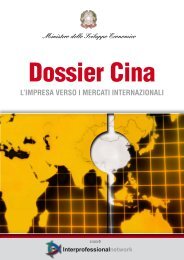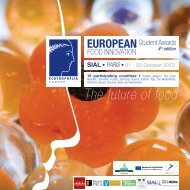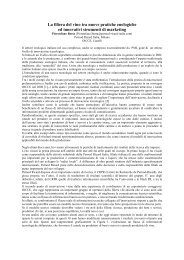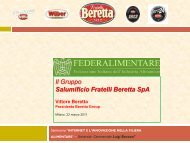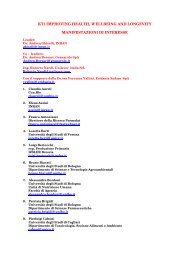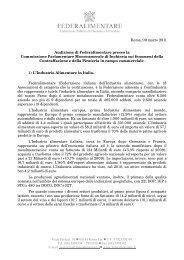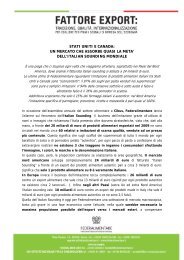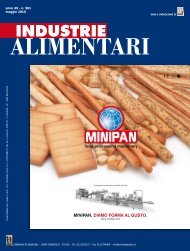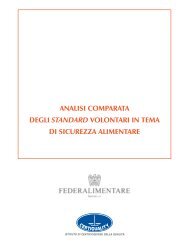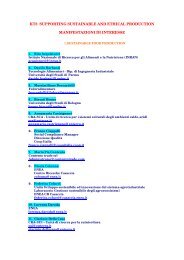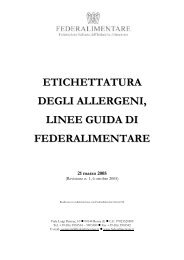- Page 2 and 3:
SISTAL - SOCIETA’ ITALIANA DI SCI
- Page 4 and 5:
SISTAl (2009)LIBRO BIANCO: Temi di
- Page 7:
PREFAZIONEIn un momento particolarm
- Page 10 and 11:
SISTAL - SOCIETA’ ITALIANA DI SCI
- Page 12:
Alma Mater Studiorum Università de
- Page 16:
PAGLIARINI Ella Caratteristiche sen
- Page 19 and 20:
Università degli Studi di Parma p.
- Page 24 and 25:
SISTAL - SOCIETA’ ITALIANA DI SCI
- Page 26 and 27:
Titolo della ricercaLA QUALITÀ DEL
- Page 28 and 29:
Titolo della ricercaTENTATIVI SPERI
- Page 30 and 31:
Titolo della ricercaRICERCA DI PARA
- Page 32 and 33:
Titolo della ricercaCARATTERIZZAZIO
- Page 34 and 35:
4. C. Lamacchia, A. Di Luccia, A. B
- Page 36 and 37:
Dati pubblicati inerenti il tema di
- Page 38 and 39:
Titolo della ricercaATTIVITÀ PRO-O
- Page 40 and 41:
Titolo della ricercaEVOLUZIONE DELL
- Page 42 and 43:
Titolo della ricercaNUOVE APPLICAZI
- Page 44 and 45:
Titolo della ricercaIL PANE DI ALTA
- Page 46 and 47:
Titolo della ricercaLA QUALITÀ DEG
- Page 48 and 49:
SISTAL - SOCIETA’ ITALIANA DI SCI
- Page 50 and 51:
Titolo della ricercaIMPIEGO DI FLUI
- Page 52 and 53:
Titolo della ricercaVALUTAZIONE DEL
- Page 54 and 55:
Titolo della ricercaSICUREZZA, SALU
- Page 56 and 57:
Titolo della ricercaIMPIEGO DI ATMO
- Page 58 and 59:
SISTAL - SOCIETA’ ITALIANA DI SCI
- Page 60 and 61:
Titolo della ricercaOSSIDAZIONE DEI
- Page 62 and 63:
4.. Ferioli F, M. F. Caboni, P.C. D
- Page 64 and 65:
more evident with the increasing of
- Page 66 and 67:
Titolo della ricercaUTILIZZO DI GAS
- Page 68 and 69:
4) Rocculi P., Tylewicz U., Siracus
- Page 70 and 71:
Dati pubblicati inerenti il tema di
- Page 72 and 73:
Titolo della ricercaINNOVAZIONE DI
- Page 74 and 75:
Titolo della ricercaANTIOSSIDANTI N
- Page 76 and 77:
Titolo della ricercaUTILIZZO DI TEC
- Page 78 and 79:
Titolo della ricercaVALUTAZIONE DI
- Page 80 and 81:
Titolo della ricercaOLIO DI OLIVA:
- Page 82 and 83:
4. Carrasco-Pancorbo A., Cerretani
- Page 84 and 85:
2. Parpinello G.P., Meluzzi A., Tal
- Page 86 and 87:
2. Angioloni, A., Balestra, F., Pin
- Page 88 and 89:
Dati pubblicati inerenti il tema di
- Page 90 and 91:
2. Versari A., Boulton R.B., Parpin
- Page 93 and 94:
Università degli Studi di CataniaS
- Page 95 and 96:
yeasts, the strain with the optimum
- Page 97 and 98: Titolo della ricercaANALISI DEL RIS
- Page 99 and 100: Titolo della ricercaCARATTERIZZAZIO
- Page 101 and 102: Titolo della ricercaMIGLIORAMENTO E
- Page 103 and 104: Titolo della ricercaANALISI SENSORI
- Page 105 and 106: of the red color index a * for Taro
- Page 107 and 108: Titolo della ricercaPROFILO SENSORI
- Page 109 and 110: Titolo della ricercaSTUDIO DELLE IN
- Page 111 and 112: Titolo della ricercaSTRATEGIE PER L
- Page 113 and 114: 4. Catalano A.E., Sapienza M., Pelu
- Page 115 and 116: Parole chiave- glicosidasi- vino- a
- Page 117 and 118: Titolo della ricercaESSICCAMENTO DI
- Page 119 and 120: SISTAL - SOCIETA’ ITALIANA DI SCI
- Page 121 and 122: Titolo della ricercaSTUDIO DELLA PR
- Page 123 and 124: Titolo della ricercaDISTRIBUZIONE D
- Page 125 and 126: Titolo della ricercaTRASFERIMENTO D
- Page 127 and 128: Titolo della ricercaPASSAGGIO DI MI
- Page 129 and 130: Dati pubblicati inerenti il tema di
- Page 131 and 132: inferiore ai 2 ug kg -1 , livello m
- Page 133 and 134: Università degli Studi di FirenzeS
- Page 135 and 136: come ad esempio il carattere “flo
- Page 137 and 138: Obiettivo della ricerca è la messa
- Page 139 and 140: Università degli Studi di FoggiaSI
- Page 141 and 142: with chitosan concentration, wherea
- Page 143 and 144: medium was assessed on Pseudomonas
- Page 145 and 146: Dati pubblicati inerenti il tema di
- Page 147: Titolo della ricercaTECNOLOGIE INNO
- Page 151 and 152: Titolo della ricercaCARATTERIZZAZIO
- Page 153 and 154: Titolo della ricercaSTUDIO DEL PROC
- Page 155 and 156: Titolo della ricercaINNOVAZIONE DI
- Page 157 and 158: Titolo della ricercaVALUTAZIONE DEL
- Page 159 and 160: Titolo della ricercaCARATTERIZZAZIO
- Page 161 and 162: Titolo della ricercaEVOLUZIONE DELL
- Page 163 and 164: Titolo della ricercaSTUDIO DELLA CO
- Page 165 and 166: Titolo della ricercaSTUDIO DELLA CO
- Page 167 and 168: 4. Baiano A., Terracone C., Gambaco
- Page 169 and 170: Dati pubblicati inerenti il tema di
- Page 171 and 172: per la selezione e l’addestrament
- Page 173 and 174: Dati pubblicati inerenti il tema di
- Page 175 and 176: Dati pubblicati inerenti il tema di
- Page 177 and 178: Titolo della ricercaSTATO DELL’AC
- Page 179 and 180: 4. Derossi A., De Pilli T., Severin
- Page 181 and 182: Titolo della ricercaSTUDIO DI NUOVI
- Page 183 and 184: Titolo della ricercaAPPLICAZIONE DE
- Page 185 and 186: Titolo della ricercaEFFETTI DI TRAT
- Page 187 and 188: Titolo della ricercaSTUDIO DEL PROC
- Page 189 and 190: Università degli Studi Mediterrane
- Page 191 and 192: Parole chiave- stabilizzazione- ali
- Page 193 and 194: Titolo della ricercaESSICCAZIONE FR
- Page 195 and 196: Titolo della ricercaVALORIZZAZIONE
- Page 197 and 198: Università degli Studi di MessinaS
- Page 199 and 200:
Dati pubblicati inerenti il tema di
- Page 201 and 202:
Università degli Studi di MilanoSI
- Page 203 and 204:
Dati pubblicati inerenti il tema di
- Page 205 and 206:
Titolo della ricercaCARATTERIZZAZIO
- Page 207 and 208:
called “electronic nose,” would
- Page 209 and 210:
an average temperature of 1.19 °C.
- Page 211 and 212:
Dati pubblicati inerenti il tema di
- Page 213 and 214:
Titolo della ricercaSTUDIO DELLE CA
- Page 215 and 216:
Titolo della ricercaIDENTIFICAZIONE
- Page 217 and 218:
Titolo della ricercaVALUTAZIONE DEL
- Page 219 and 220:
4. Hidalgo A., Brandolini A (2008).
- Page 221 and 222:
Dati pubblicati inerenti il tema di
- Page 223 and 224:
Titolo della ricercaVALUTAZIONE DEL
- Page 225 and 226:
of both methods to follow the rice
- Page 227 and 228:
SISTAL - SOCIETA’ ITALIANA DI SCI
- Page 229 and 230:
Dati pubblicati inerenti il tema di
- Page 231 and 232:
Titolo della ricercaOTTIMIZZAZIONE
- Page 233 and 234:
5. Mariotti, M., Lucisano, M., Paga
- Page 235 and 236:
Titolo della ricercaIL PROCESSO DI
- Page 237 and 238:
Titolo della ricercaIL PROCESSO DI
- Page 239 and 240:
3. Pagani, M.A., Bottega, G., Caram
- Page 241 and 242:
Dati pubblicati inerenti il tema di
- Page 243 and 244:
Titolo della ricercaINFLUENZA DELLA
- Page 245 and 246:
4. M. Laureati, E. Pagliarini, 2008
- Page 247 and 248:
Dati pubblicati inerenti il tema di
- Page 249 and 250:
Titolo della ricercaCRITERI INNOVAT
- Page 251 and 252:
Titolo della ricercaCOATINGS SALDAN
- Page 253 and 254:
Titolo della ricercaEFFETTI DELLA L
- Page 255 and 256:
Titolo della ricercaPREVISIONE ED E
- Page 257 and 258:
Titolo della RicercaMESSA A PUNTO D
- Page 259 and 260:
Titolo della ricercaASPETTI TECNOLO
- Page 261 and 262:
Titolo della ricercaOTTIMIZZAZIONE
- Page 263 and 264:
Titolo della ricercaFRITTURA AD IMM
- Page 265 and 266:
Titolo della ricercaSTUDIO DEI FATT
- Page 267 and 268:
4. Casiraghi, E., Alamprese, C., Ro
- Page 269 and 270:
Titolo della ricercaPRESENZA DI MIC
- Page 271 and 272:
Titolo della ricercaACETO BALSAMICO
- Page 273 and 274:
Titolo della ricercaAROMI DI PRODOT
- Page 275 and 276:
Titolo della ricercaIL COLORE DI AL
- Page 277 and 278:
SISTAL - SOCIETA’ ITALIANA DI SCI
- Page 279 and 280:
Titolo della ricercaUTILIZZO DELLE
- Page 281 and 282:
Titolo della ricercaSVILUPPO DI ING
- Page 283 and 284:
4. Russo F., Chimienti G., Riezzo G
- Page 285 and 286:
Dati pubblicati inerenti il tema di
- Page 287 and 288:
Titolo della ricercaANALISI DI COMP
- Page 289 and 290:
Titolo della ricercaINNOVAZIONE DI
- Page 291 and 292:
SISTAL - SOCIETA’ ITALIANA DI SCI
- Page 293 and 294:
Titolo della ricerca:PROTEOMA ED IN
- Page 295 and 296:
Titolo della ricercaSTRUTTURA E PRO
- Page 297 and 298:
Titolo della ricercaVALORIZZAZIONE
- Page 299 and 300:
4. Quarto M, Garro G, Nasi A, Roman
- Page 301 and 302:
2. Nasi A, Mercurio V, Ferranti P,
- Page 303 and 304:
2. Quarto M, Sacchi R, Paduano A, N
- Page 305 and 306:
3. Pizzichini M, Vitagliano M, Pizz
- Page 307 and 308:
technology” affect consumer accep
- Page 309 and 310:
Dati pubblicati inerenti il tema di
- Page 311 and 312:
Dati pubblicati inerenti il tema di
- Page 313 and 314:
Titolo della ricercaI POLIFENOLI E
- Page 315 and 316:
Titolo della ricercaINNOVAZIONE DI
- Page 317 and 318:
Titolo della ricercaSVILUPPO DI PRO
- Page 319 and 320:
Titolo della ricercaOTTIMIZZAZIONE
- Page 321 and 322:
4. Lisanti MT, Piombino P, Gambuti
- Page 323:
2. Romano R, Borriello I, Spagna Mu
- Page 327 and 328:
SISTAL - SOCIETA’ ITALIANA DI SCI
- Page 329 and 330:
Titolo della ricercaCARATTERIZZAZIO
- Page 331 and 332:
4. Vincenzi S., Polesani M., Curion
- Page 333 and 334:
Per quanto riguarda la PPO, sono st
- Page 335 and 336:
Titolo della ricercaSTUDIO DELL’E
- Page 337 and 338:
3) De Zorzi M., Curioni A., Simonat
- Page 339 and 340:
Dati pubblicati inerenti il tema di
- Page 341 and 342:
SISTAL - SOCIETA’ ITALIANA DI SCI
- Page 343 and 344:
Titolo della ricercaAPPLICAZIONE DI
- Page 345 and 346:
Titolo della ricercaOLIO VERGINE D
- Page 347 and 348:
Titolo della ricercaQUALITÀ DEI VI
- Page 349 and 350:
Dati pubblicati inerenti il tema di
- Page 351 and 352:
Titolo della ricercaESPRESSIONE DEG
- Page 353 and 354:
Titolo della ricercaINNOVAZIONE DI
- Page 355 and 356:
ols and phenolic compounds) were ca
- Page 357 and 358:
Titolo della ricercaSTUDIO DELLE CI
- Page 359 and 360:
Titolo della ricercaSTUDIO SULLE CO
- Page 361 and 362:
Titolo della ricercaCARATTERIZZAZIO
- Page 363 and 364:
4. Chiavaro E., Rodriguez-Estrada M
- Page 365 and 366:
shear force, crust hardness, colour
- Page 367 and 368:
Dati pubblicati inerenti il tema di
- Page 369 and 370:
This practice is actually aimed to
- Page 371 and 372:
studied. Vastedda, according to Cod
- Page 373 and 374:
Dati pubblicati inerenti il tema di
- Page 375 and 376:
SISTAL - SOCIETA’ ITALIANA DI SCI
- Page 377 and 378:
Titolo della ricercaLA TRACCIABILIT
- Page 379 and 380:
Dati pubblicati inerenti il tema di
- Page 381 and 382:
Titolo della ricercaINNOVAZIONE NEL
- Page 383 and 384:
4) Montedoro GF., Esposto S., Tatic
- Page 385 and 386:
Dati pubblicati inerenti il tema di
- Page 387 and 388:
Titolo della ricercaESTRAZIONE DI O
- Page 389 and 390:
5) Servili M., Taticchi A., Esposto
- Page 391 and 392:
Dati pubblicati inerenti il tema di
- Page 393 and 394:
Dati pubblicati inerenti il tema di
- Page 395 and 396:
Dati pubblicati inerenti il tema di
- Page 397 and 398:
Titolo della ricercaSVILUPPO DI SIS
- Page 399 and 400:
Titolo della ricercaQUALITÀ, SICUR
- Page 401 and 402:
considered as the most important, d
- Page 403 and 404:
Titolo della ricercaESTRAZIONE DEI
- Page 405 and 406:
Titolo della ricercaL’IMPIEGO DEL
- Page 407 and 408:
Titolo della ricercaLO SVILUPPO DI
- Page 409 and 410:
Titolo della ricercaL’IMPIEGO DI
- Page 411 and 412:
SISTAL - SOCIETA’ ITALIANA DI SCI
- Page 413 and 414:
Titolo della ricercaINTERAZIONE FRA
- Page 415 and 416:
Titolo della ricercaBIRRA DA FARRO
- Page 417 and 418:
Titolo della ricercaPRESENZA DELL
- Page 419 and 420:
2. E. Boselli, M.Minardi, A. Giomo,
- Page 421 and 422:
Although ω3 were predominantly lin
- Page 423 and 424:
Titolo della ricercaPROLUNGAMENTO D
- Page 425 and 426:
Titolo della ricercaPROLUNGAMENTO D
- Page 427 and 428:
Titolo della ricercaPROCESSI INNOVA
- Page 429 and 430:
Titolo della ricercaINNOVAZIONE ED
- Page 431 and 432:
fenomeni ossidativi. Le temperature
- Page 433 and 434:
Parole chiave- sensori- biosensori-
- Page 435 and 436:
Titolo della ricercaSTUDIO DELL’I
- Page 437 and 438:
Titolo della ricercaINFLUENZA DELLE
- Page 439 and 440:
Titolo della ricercaEFFETTO DI DIVE
- Page 441 and 442:
Titolo della ricercaPRODOTTI DOLCIA
- Page 443 and 444:
Titolo della ricercaVALUTAZIONE DEL
- Page 445 and 446:
4. Del Caro A., M. A. Madrau, A. Pi
- Page 447 and 448:
Dati pubblicati inerenti il tema di
- Page 449 and 450:
Titolo della ricercaINFLUENZA DELLE
- Page 451 and 452:
Titolo della ricercaSTUDIO DELL’A
- Page 453 and 454:
5. Sacchetti G., Di Mattia C., Piva
- Page 455 and 456:
Dati pubblicati inerenti il tema di
- Page 457 and 458:
Titolo della ricercaEFFETTO DEI PRO
- Page 459 and 460:
Titolo della ricercaEFFETTO DELLE C
- Page 461 and 462:
Titolo della ricercaAPPROCCIO TECNO
- Page 463 and 464:
4. Dimitri G., Piva A., Di Mattia C
- Page 465 and 466:
Linear discriminant analysis achiev
- Page 467 and 468:
Università degli Studi di TorinoSI
- Page 469 and 470:
Dati pubblicati inerenti il tema di
- Page 471 and 472:
Dati pubblicati inerenti il tema di
- Page 473 and 474:
Dati pubblicati inerenti il tema di
- Page 475 and 476:
Titolo della ricercaMETODOLOGIE INN
- Page 477 and 478:
Titolo della ricercaTECNICHE DI APP
- Page 479 and 480:
Titolo della ricercaCARATTERIZZAZIO
- Page 481 and 482:
4. Zeppa G., Gerbi V. (2008) Valuta
- Page 483 and 484:
Dati pubblicati inerenti il tema di
- Page 485 and 486:
Titolo della ricercaUTILIZZO DI COM
- Page 487 and 488:
4. Giordano M., Belviso S., Grosso
- Page 489 and 490:
Dati pubblicati inerenti il tema di
- Page 491 and 492:
Università degli Studi della Tusci
- Page 493 and 494:
Dati pubblicati inerenti il tema di
- Page 495 and 496:
Dati pubblicati inerenti il tema di
- Page 497 and 498:
ottenuti sono stati confrontati con
- Page 499 and 500:
6. Andrich L, Esti M, Moresi M (200
- Page 501 and 502:
Parole chiave- prodotti della quart
- Page 503 and 504:
Dati pubblicati inerenti il tema di
- Page 505 and 506:
Parole chiave- essiccamento uva- wa
- Page 507 and 508:
Titolo della ricercaPROCESSI A MEMB
- Page 509 and 510:
4. Moresi M., Sebastiani I. (2008)
- Page 511 and 512:
Dati pubblicati inerenti il tema di
- Page 513 and 514:
Titolo della ricercaSVILUPPO DI PRO
- Page 515 and 516:
Università degli Studi di UdineSIS
- Page 517 and 518:
Dati pubblicati inerenti il tema di
- Page 519 and 520:
- microrganismiDati pubblicati iner
- Page 521 and 522:
Dati pubblicati inerenti il tema di
- Page 523 and 524:
Dati pubblicati inerenti il tema di
- Page 525 and 526:
SISTAl (2009)LIBRO BIANCO: Temi di



